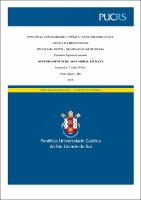| Share record |


|
Please use this identifier to cite or link to this item:
https://tede2.pucrs.br/tede2/handle/tede/7979Full metadata record
| DC Field | Value | Language |
|---|---|---|
| dc.creator | Fernando, Celestino Taperero | - |
| dc.creator.Lattes | http://lattes.cnpq.br/3734712541571444 | por |
| dc.contributor.advisor1 | Weber, Thadeu | - |
| dc.contributor.advisor1Lattes | http://lattes.cnpq.br/0652643529727347 | por |
| dc.date.accessioned | 2018-05-03T20:18:38Z | - |
| dc.date.issued | 2018-02-22 | - |
| dc.identifier.uri | http://tede2.pucrs.br/tede2/handle/tede/7979 | - |
| dc.description.resumo | A presente dissertação tem como objetivo compreender em que consiste o valor moral do agir humano na filosofia prática de Kant. Kant defende que a moral é o princípio da razão universal, capaz de limitar os impulsos humanos, em virtude das necessidades naturais. A consciência moral nessa circunstância é produto da razão pura prática, que possibilita a aplicação da teoria à prática em função da liberdade do sujeito transcendental de pensar e agir. Contudo, o imperativo categórico é o comando das ações morais, que se encontra no sujeito autônomo, mediante a relação entre a boa vontade e a liberdade. E a dignidade é uma qualidade que naturalmente os seres finitos têm enquanto entes morais. A dignidade do humano se traduz em sua capacidade de agir conforme a representação de leis determinadas por ele mesmo, de modo que, o homem não deveria estar submetido a qualquer outro fim que não o de sua própria razão, a saber, o da própria moralidade, que implica o cumprimento do “dever pelo dever. Diante dessa ideia, a pessoa humana é ela própria que é a medida e a fonte do dever (Solen). Porque a razão só conhece aquilo que ela mesma projetou. Enquanto que o “eu” puro da pessoa só é possível quando há reconhecimento que é um ser de deveres, direito e autônomo. A formalidade kantiana parte na distinção entre moralidade e legalidade de modo a possibilitar a coexistência entre elas. É também nessa posição onde o conceito de direito tem as suas raízes. Para o autor, a relação entre ética e direito é uma relação de subordinação. | por |
| dc.description.abstract | The purpose of this dissertation is to understand the moral value of human action in Kant's practical philosophy. Kant argues that morality is the principle of universal reason, capable of limiting human impulses, since, by virtue of natural needs. The moral conscience in this circumstance is a product of pure practical reason, which enables the application of theory to practice in function of the freedom of the transcendental subject to think and act. However, the categorical imperative is the command of moral actions, which is found in the autonomous subject, through the relation between goodwill and freedom. And dignity is a quality that naturally finite beings have as moral beings. The dignity of the human is translated in his capacity to act according to the representation of laws determined by himself, so that man should not be subject to any other purpose than that of his own reason, namely that of his own morality, which implies the fulfillment of "duty for duty. Faced with this idea, the human person is himself the measure and source of duty (Solen). Because reason knows only what it has projected itself. Whereas the pure "I" of the person is only possible when there is recognition that he is a being of duties, right and autonomous. Kantian formality starts with the distinction between morality and legality in order to allow coexistence between them. It is also in this position that the concept of law has its roots. For the author, the relationship between ethics and law is a relationship of subordination. | eng |
| dc.description.provenance | Submitted by PPG Filosofia ([email protected]) on 2018-04-16T17:34:29Z No. of bitstreams: 1 CELESTINO TEPERERO FERNANDO.pdf: 1022365 bytes, checksum: e268631125f7e92cb43a0aa9649d3ab0 (MD5) | eng |
| dc.description.provenance | Approved for entry into archive by Caroline Xavier ([email protected]) on 2018-05-03T20:15:42Z (GMT) No. of bitstreams: 1 CELESTINO TEPERERO FERNANDO.pdf: 1022365 bytes, checksum: e268631125f7e92cb43a0aa9649d3ab0 (MD5) | eng |
| dc.description.provenance | Made available in DSpace on 2018-05-03T20:18:38Z (GMT). No. of bitstreams: 1 CELESTINO TEPERERO FERNANDO.pdf: 1022365 bytes, checksum: e268631125f7e92cb43a0aa9649d3ab0 (MD5) Previous issue date: 2018-02-22 | eng |
| dc.description.sponsorship | Coordenação de Aperfeiçoamento de Pessoal de Nível Superior - CAPES | por |
| dc.format | application/pdf | * |
| dc.thumbnail.url | http://tede2.pucrs.br:80/tede2/retrieve/171723/CELESTINO%20TEPERERO%20FERNANDO.pdf.jpg | * |
| dc.language | por | por |
| dc.publisher | Pontifícia Universidade Católica do Rio Grande do Sul | por |
| dc.publisher.department | Escola de Humanidades | por |
| dc.publisher.country | Brasil | por |
| dc.publisher.initials | PUCRS | por |
| dc.publisher.program | Programa de Pós-Graduação em Filosofia | por |
| dc.rights | Acesso Aberto | por |
| dc.subject | Razão | por |
| dc.subject | Liberdade | por |
| dc.subject | Vontade | por |
| dc.subject | Dever | por |
| dc.subject | Moral | por |
| dc.subject | Direito | por |
| dc.subject.cnpq | CIENCIAS HUMANAS::FILOSOFIA | por |
| dc.title | Os fundamentos do agir moral em Kant | por |
| dc.type | Dissertação | por |
| dc.restricao.situacao | Trabalho não apresenta restrição para publicação | por |
| Appears in Collections: | Programa de Pós-Graduação em Filosofia | |
Files in This Item:
| File | Description | Size | Format | |
|---|---|---|---|---|
| CELESTINO TEPERERO FERNANDO.pdf | CELESTINO_TEPERERO_FERNANDO_DIS | 998.4 kB | Adobe PDF |  Download/Open Preview |
Items in DSpace are protected by copyright, with all rights reserved, unless otherwise indicated.




